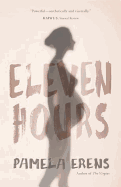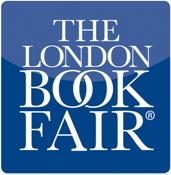 Less than two weeks after the Perseus sales closed--Hachette bought the company's publishing operations and Ingram bought its distribution business--there was a lot of interchange among the three stands at the London Book Fair last week. Staff mixed freely, some Perseus staffers wore Ingram badge holders, and everyone spoke positively about the sales.
Less than two weeks after the Perseus sales closed--Hachette bought the company's publishing operations and Ingram bought its distribution business--there was a lot of interchange among the three stands at the London Book Fair last week. Staff mixed freely, some Perseus staffers wore Ingram badge holders, and everyone spoke positively about the sales.
One of our favorite moments was at a Perseus/Ingram booth party, seeing Ingram's John Ingram and Hachette's Michael Pietsch speaking tête-à-tête.
---
"Creating a beautiful space for customers to shop in is incredibly important," said Farah Taylor, the buyer and manager of Alef Bookstore in London. Alef, named for the first letter in the Arabic alphabet, sells books in English and Arabic and is part of a chain that has more than 30 locations in Egypt. Taylor spoke at a Booksellers Association seminar on creating beautiful bookshops.
"Even more paramount is how you lay out your store to encourage people to purchase," she continued. "You don't have to have every single genre. I think gone are the days of bookshops that contain every genre under the sun. When space is at a premium you have to think carefully about what will sell. Having a selection that caters to your market is key."
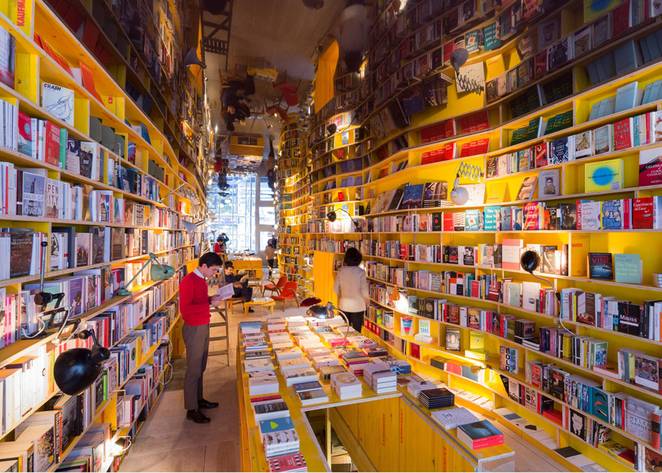 |
| Libreria interior (photo: Selgas Cano) |
At the same seminar, Sally Davies, the director of Libreria, a new bookshop in eastern London, said that she and her team display books thematically rather than by genre, with the one concession to convention being that one side of the store is all fiction and the other is all nonfiction. Part of the selling point, she explained, is the enhanced sense of discovery and serendipity.
"Amazon does do a good job at a particular thing, which is giving you what you already know you want," said Davies. Bookshops, however, can help customers discover "what you don't know you want." Online and on Amazon, she continued, users end up getting caught in annoying recursive loops and "end up burrowing down into [their] own set of interests" rather than expanding their boundaries.
Davies also said that while she and her staff adjust Libreria's inventory over time based on what the community wants, she is hesitant to become too data driven, because "you bring yourself into conformity with everything else."
And due to the store's unconventional layout, Davies added, it is imperative that booksellers know the stock inside and out.
---
"More and more, fathers are increasingly buying books as gifts for their sons," said Andre Breedt, international director of Nielsen Book Research, during a Booksellers Association seminar called Sourcing and Using Information to Help You Run a Better Bookshop.
"They still buy fewer books than mothers buy for their children, but they are buying more than they have in recent years," noted Breedt. When buying books, fathers tend to be impulse buyers. They also tend to buy game guides and other "debatably self-improving" titles for their sons.
---
Christine Gordon, event coordinator for Readings Books, Music and Film in Melbourne, Australia, said that after a decade of planning and running events, she can usually predict which events drive the most book sales. At off-site events, maybe one in 10 people will buy the book, while about one in three buy the book at an author event that's held in store. She said she imagined this is the case with off-site events because there may be some extra travel costs or logistical concerns. The major exception, she noted, is large off-site events where purchase of the book is required.
During the same session, which presented a number of case studies of book fairs and literary festivals, Gordon argued that bookstore events can sometimes have wide-reaching effects. A huge Harry Potter launch party 10 years ago, she recalled, bolstered Readings' business and helped drive out a Borders that had opened across the street. And in 2011, a panel about the under-representation of women in Australian publishing, book reviews and literary prizes held on International Women's Day led, two years later, to the creation of the Stella Prize, an annual literary award for Australian women writers.
---
"The more engaged the author is, the more likely the book is going to get funded," said John Mitchinson, the co-founder of the crowdfunding publishing platform Unbound, during a panel discussion at the London Book Fair on Tuesday, when asked what sorts of books generally do better with crowdfunding. "Broad, difficult, challenging literary novels," he added, typically have a harder time than books written by people who already have large followings.
The panel, entitled The Wisdom of the Crowds: Crowdfunding and Crowdsourcing, also featured Jan Kasprzycki-Rosikon, the managing director of Polish crowdsourcing company MillionYou, and Enrique Parilla, CEO of the Spanish crowdfunding platform Pentian. Angus Phillips, director of the Oxford International Centre for Publishing Studies, served as moderator.
Broadly speaking, said Parilla, "fiction and self-help are the genres that work best," but he has noticed that "the books that fund fastest are those with a very small audience." As an example, he pointed to a book on the history of classical marching bands in Spain that was funded in days. "There are only 180 people interested in that [subject]," joked Parilla, "but all 180 of them put money in that book."
Mitchinson later added that he was "very keen" on the potential for crowdfunding platforms to address issues of underrepresentation in the traditional publishing industry. "I see that as a massive opportunity for crowdfunding," said Mitchinson. --Alex Mutter and John Mutter
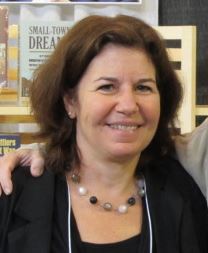









 Bookstore sales in February rose 7.2%, to $732 million, compared to February 2015, according to preliminary estimates from the Census Bureau. This marked the sixth consecutive month that bookstore sales have risen, following a gain of 3.8% in January, a jump of 9.6% in December, rises of nearly 7% in September and October, and 7.5% in November.
Bookstore sales in February rose 7.2%, to $732 million, compared to February 2015, according to preliminary estimates from the Census Bureau. This marked the sixth consecutive month that bookstore sales have risen, following a gain of 3.8% in January, a jump of 9.6% in December, rises of nearly 7% in September and October, and 7.5% in November. 
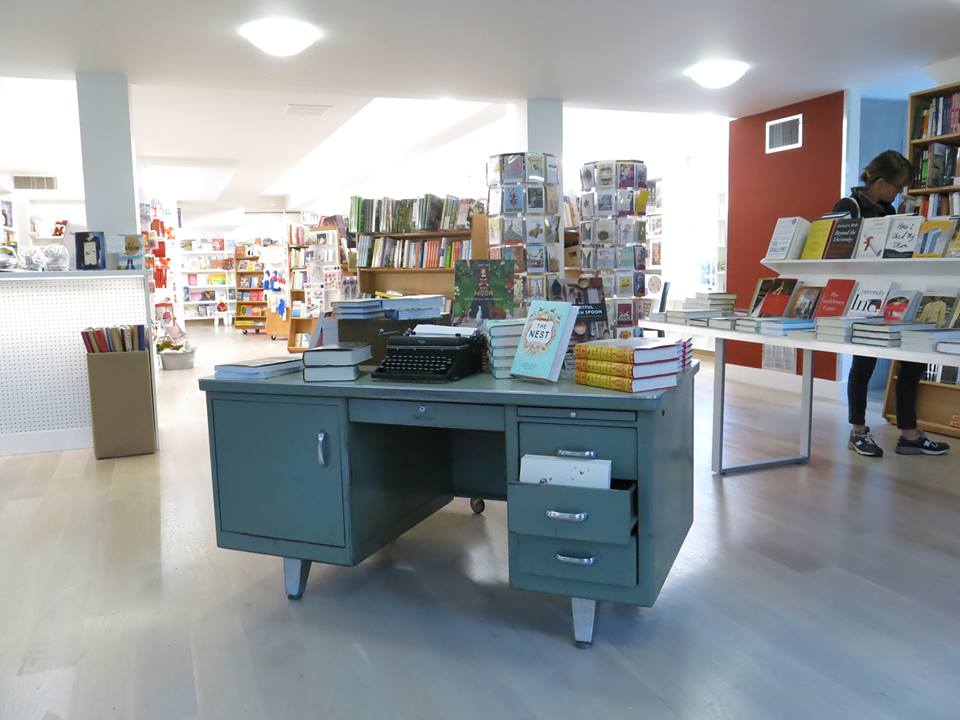

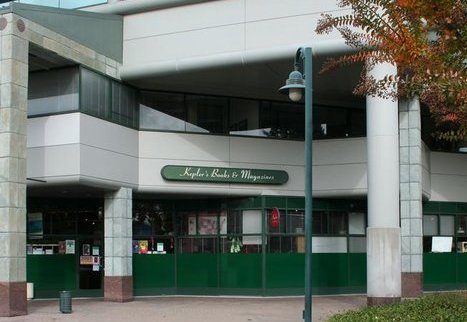 Adrienne Etherton, Sustainable's executive director, said Kepler's is "addressing all of the different pieces of the puzzle. It's an organization that's in a tough industry... that really speaks to the economics, but you also have the social justice aspect with increasing wages. I also like the democratically run nature of Kepler's." Sustainable praised the store's nonprofit, Peninsula Arts & Letters, which "offers lectures, panel discussions, on-stage interviews and educational workshops with a goal of supporting lifelong learning and literacy"; and noted that CEO Praveen Madan shares his "open-source" business model with other bookstores.
Adrienne Etherton, Sustainable's executive director, said Kepler's is "addressing all of the different pieces of the puzzle. It's an organization that's in a tough industry... that really speaks to the economics, but you also have the social justice aspect with increasing wages. I also like the democratically run nature of Kepler's." Sustainable praised the store's nonprofit, Peninsula Arts & Letters, which "offers lectures, panel discussions, on-stage interviews and educational workshops with a goal of supporting lifelong learning and literacy"; and noted that CEO Praveen Madan shares his "open-source" business model with other bookstores. Less than two weeks after the
Less than two weeks after the 

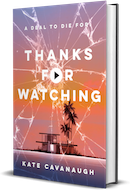
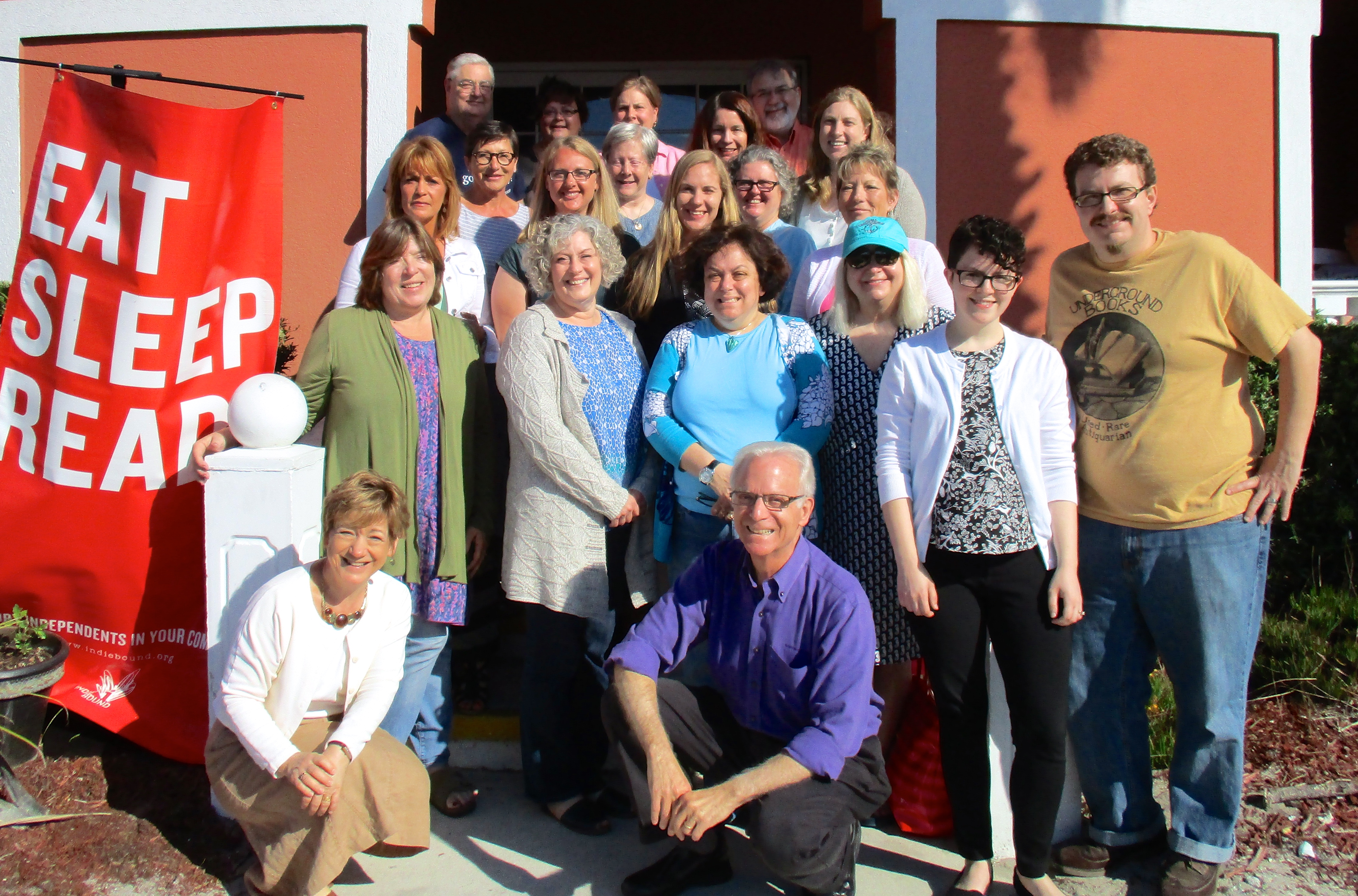 During the workshop retreat Owning a Bookstore: The Business Essentials, facilitated by the Bookstore Training Group of Paz & Associates, co-sponsored by the American Booksellers Association, and held earlier this month, 12 book industry trainers shared best practices of bookstore retail management with prospective and existing booksellers from Maine to Washington.
During the workshop retreat Owning a Bookstore: The Business Essentials, facilitated by the Bookstore Training Group of Paz & Associates, co-sponsored by the American Booksellers Association, and held earlier this month, 12 book industry trainers shared best practices of bookstore retail management with prospective and existing booksellers from Maine to Washington. 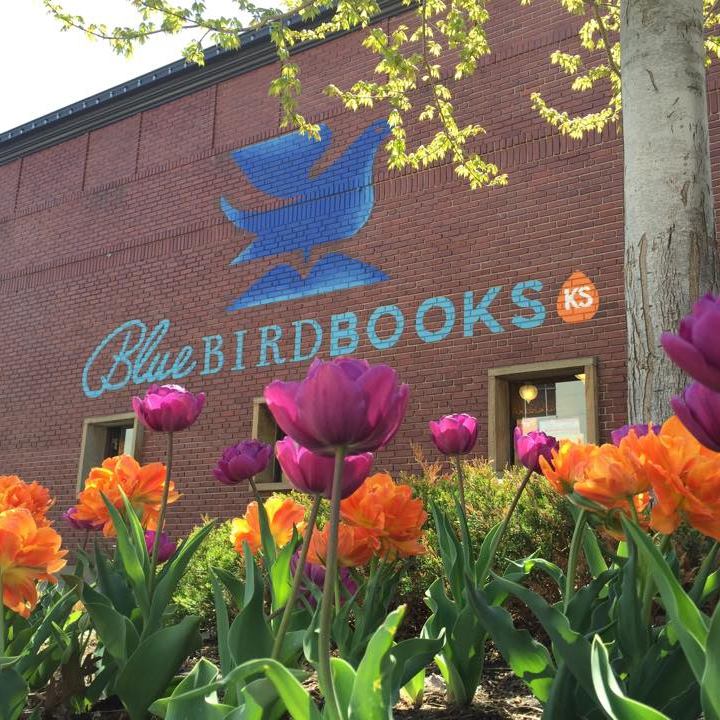 The Midwest Independent Booksellers Association visited
The Midwest Independent Booksellers Association visited 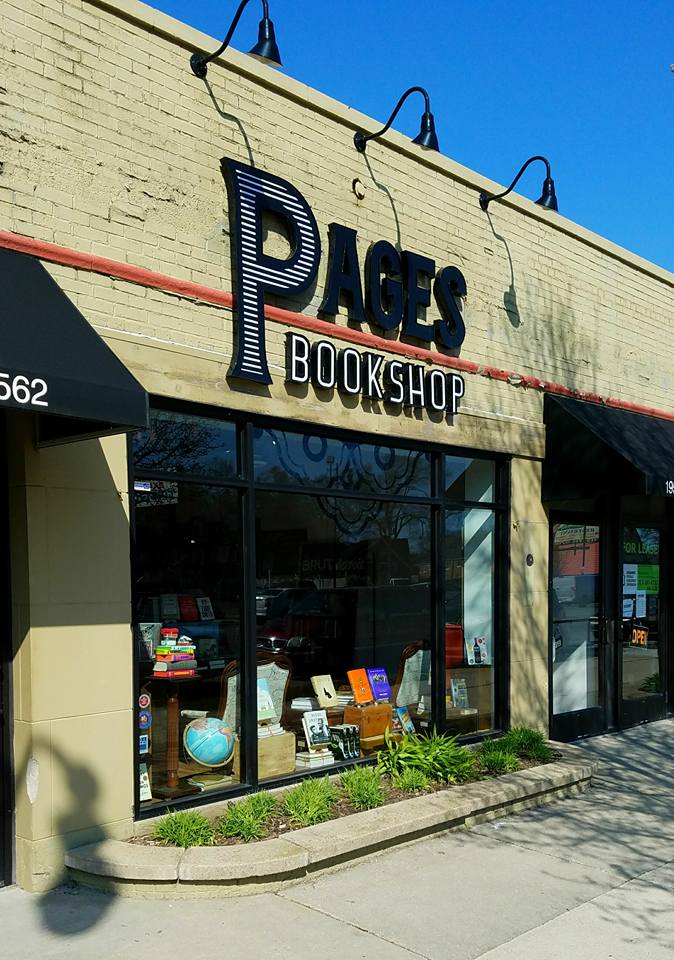 Congratulations to
Congratulations to 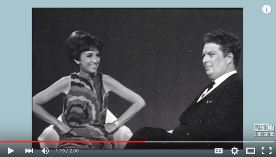 Enter Helen: The Invention of Helen Gurley Brown and the Rise of the Modern Single Woman
Enter Helen: The Invention of Helen Gurley Brown and the Rise of the Modern Single Woman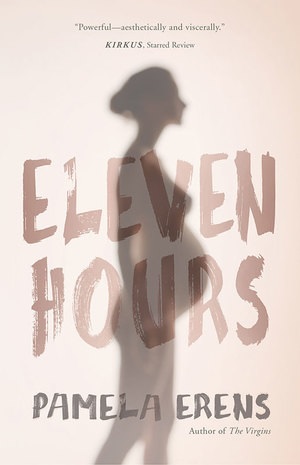 With rigorous detail and moment-by-moment exposition, Pamela Erens drops readers into one of the most personal and specific experiences a woman can go through in her lifetime: labor. In shifting points of view, Eleven Hours documents the story of two women who forge a relationship based solely on the experience of childbirth. There's Lore, who arrives at the hospital with no partner and no friends to support her, but she has a carefully laid-out plan for what she will not allow during her labor: no fetal monitor, no IV and no epidural. Franckline, also pregnant, is the nurse assigned to monitor Lore throughout her labor. Since she was six years old, Franckline has watched and helped the women of her village in Haiti deliver their babies; she was called the Ti Matrone, the little midwife. Together, these two strangers form an intimate bond as Lore's labor progresses during a snowy day in New York City.
With rigorous detail and moment-by-moment exposition, Pamela Erens drops readers into one of the most personal and specific experiences a woman can go through in her lifetime: labor. In shifting points of view, Eleven Hours documents the story of two women who forge a relationship based solely on the experience of childbirth. There's Lore, who arrives at the hospital with no partner and no friends to support her, but she has a carefully laid-out plan for what she will not allow during her labor: no fetal monitor, no IV and no epidural. Franckline, also pregnant, is the nurse assigned to monitor Lore throughout her labor. Since she was six years old, Franckline has watched and helped the women of her village in Haiti deliver their babies; she was called the Ti Matrone, the little midwife. Together, these two strangers form an intimate bond as Lore's labor progresses during a snowy day in New York City.